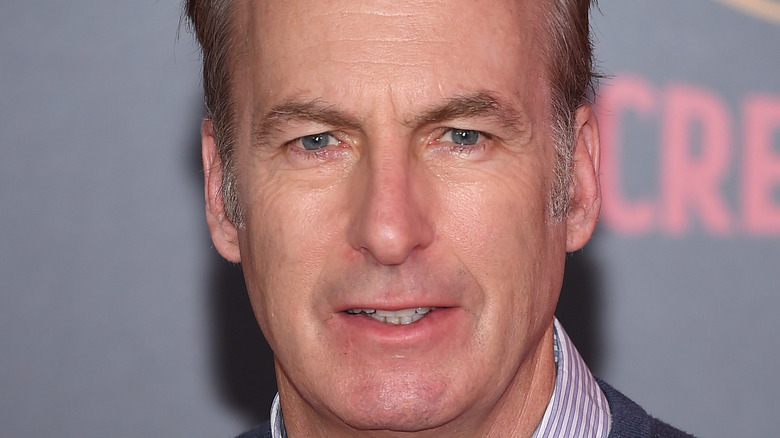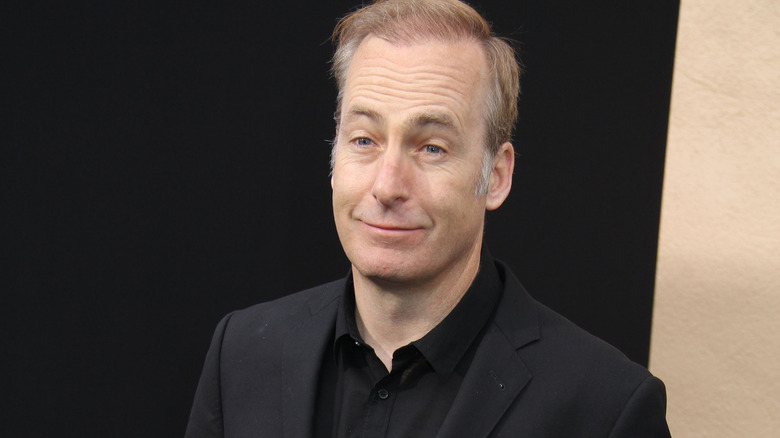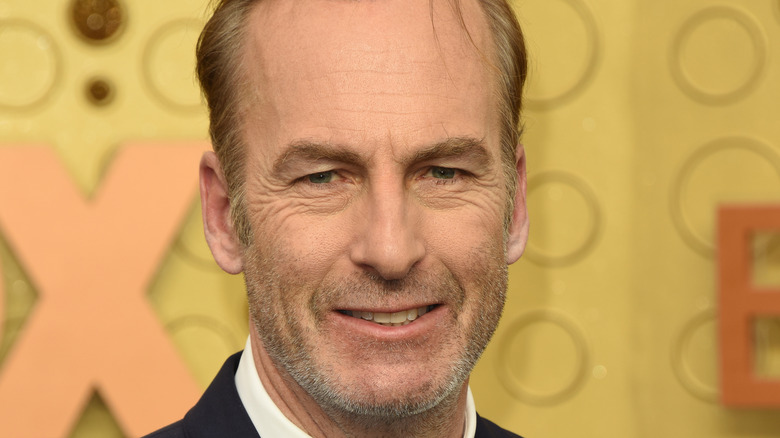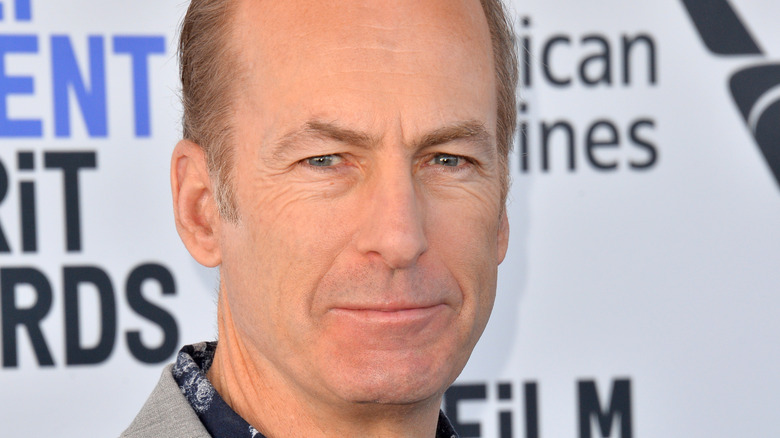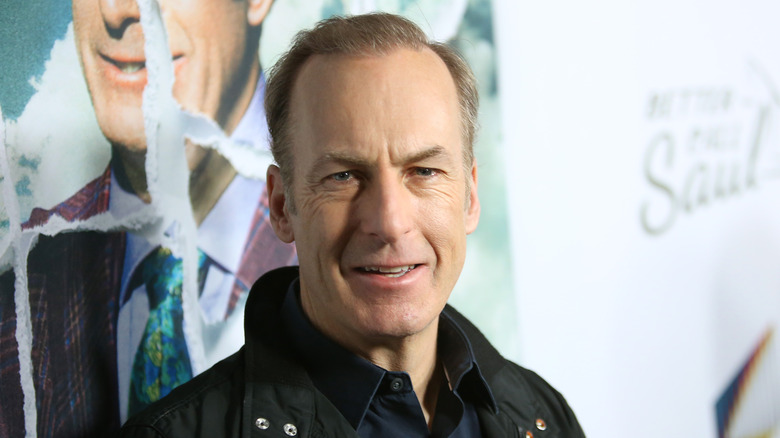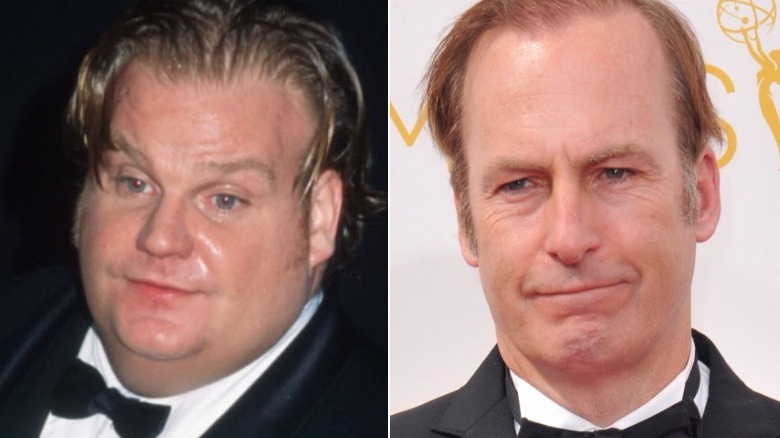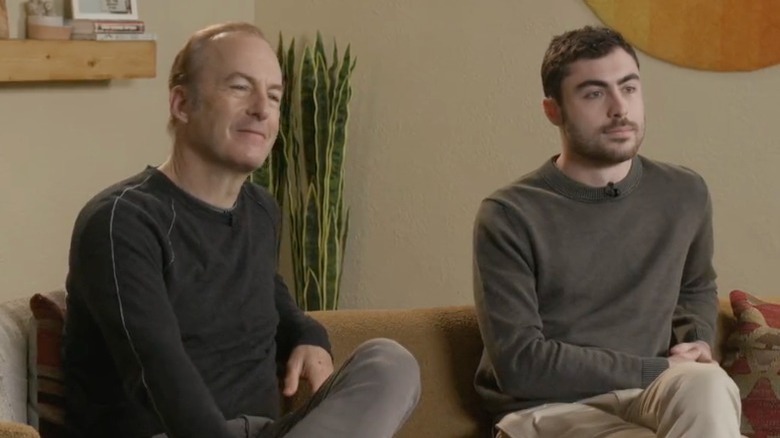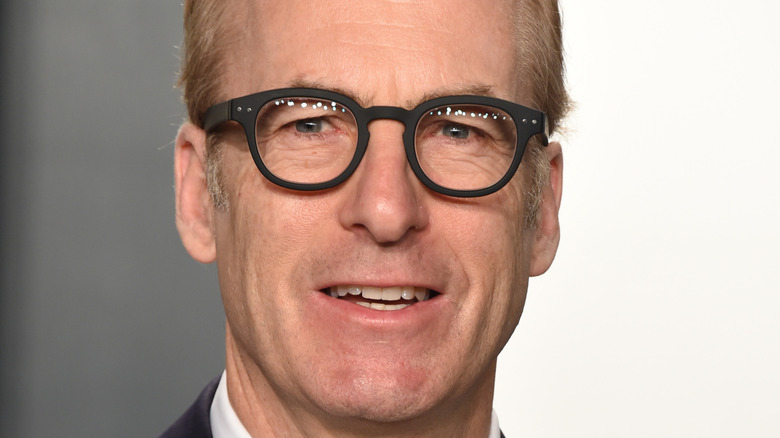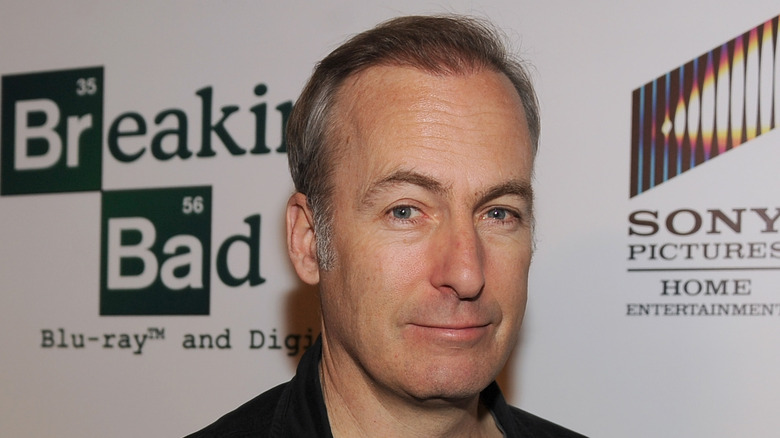The Tragic Real-Life Story Of Bob Odenkirk
Bob Odenkirk broke through as the greasy yet oddly likable lawyer on "Breaking Bad," and when audiences found they couldn't get enough of him, creator Vince Gilligan and Peter Gould decided to cast him as the lead role in a chaotic, hilarious spinoff called "Better Call Saul."
In both series, Odenkirk plays Saul Goodman but the big shift comes in "Better Call Saul" because we see a pathos to the character that didn't get to come out in "Breaking Bad." Odenkirk plays the lawyer as extremely fallible and yet audiences can't help but cheer him on as the lovable schmuck who just can't catch a break. Speaking of his comedic streak and his acting chops, Odenkirk spoke with the Chicago Tribune and said, "I try genuinely not to think of myself at all. But I guess I am an actor... technically."
Part of Odenkirk's reticence to sing his own praises comes from the fact that he had to work for many years to be recognized as a star. "Basically, I haven't been pigeonholed by massive success," he told the Chicago Tribune laughing. "I didn't become famous on a large stage for doing one thing, which meant I had to gain respect for everything I did ... I am taken seriously with new things because, paradoxically, I haven't been massively successful." We've got so much respect for the determination Odenkirk brought to his craft. While this is something to celebrate, he's had some serious rough patches along the way.
His traumatic relationship with his father
Bob Odenkirk didn't have a happy relationship with his father, Wally Odenkirk. Bob was one of seven children and his father, an active alcoholic, didn't provide a stable situation for them. Relaying a memory when he was 9 years old, Bob told The New York Times, "My dad wakes me up at 2 a.m. to tell me he's leaving and he'll send me money to pay the bills, and I'm thinking, I don't know cursive enough to write the check, so how am I going to pay the bills?"
In his memoir "Comedy Comedy Comedy Drama," Bob wrote that his father "was rough and too intense, and those were his good qualities." The "Breaking Bad" star wrote about his father's irascible temper and his consistent absence from home, which meant that Bob got the chance to bond with his siblings, but felt the absence of a father figure.
But the author and actor knows how to spin straw into gold. While he admits that he didn't get what he needed, he also has learned to use the pain in his acting. "Let me just make myself that kid again, because I'll take that feeling of loss and fear and play it tomorrow!" he told The New York Times. He went on, "If there was one thing that let me do this, it was some access I have to the emotional, even traumatic spaces inside me that maybe isn't the most healthy person to be."
If you or anyone you know is struggling with addiction issues, help is available. Visit the Substance Abuse and Mental Health Services Administration website or contact SAMHSA's National Helpline at 1-800-662-HELP (4357).
Bob Odenkirk felt disconnected from his hometown
No doubt exacerbated by the lack of harmony in his childhood home, Bob Odenkirk said that he didn't care for his hometown, Naperville, a suburb outside of Chicago, Illinois. In a very candid interview with Time Out in 2010, Odenkirk explained why he said he hated Naperville as a child. "Because it wasn't exciting enough," he explained. "It felt like a dead end, like Nowheresville. I couldn't wait to move into a city and be around people who were doing exciting things."
That feeling evolved as Odenkirk grew up — and moved away — from that small town. He told Time Out that as an adult, he had fonder feelings for his hometown. "At 15 years old, I couldn't wait to get out, but at 47, I have great appreciation for it," he said. "There's lots more people and maybe therefore more interesting people as well. Also, I think you can get the Internet there."
When Odenkirk finally moved to Chicago proper, he told the Chicago Tribune that he arrived in a rage. "I was intense, definitely an angry guy," he said of his early years as an adult. "That can be a good thing. It can mean your commitment is through the roof, which can be fun to watch from the audience's perspective. Because it's always fun to watch someone get frustrated or want something desperately and not be able to get it. But I had to modulate that." Once again, Odenkirk used real-life feelings to feed his characters.
His father died when he was 22
Bob Odenkirk's father died of cancer when the father and son were almost completely estranged. In his memoir, Odenkirk wrote about the event with a casualness that reflects how strained their relationship really was. "I would only see my dad a few scant times until I got a call, when I was 22, telling me that he was dying," Odenkirk wrote. "His life was nothing but tragedy, and fairly small-potatoes tragedy, a life barely lived. Saying goodbye to him was a shrugging affair."
Odenkirk's reaction to his father's death might seem callous to some, but he explained to The New York Times how he processed the experience. "I've often felt like I must be hiding something, or not acknowledging something, or can't see something," he said. "There's no question I wish I had a father figure in life, especially as a kid, especially a good one. Wouldn't that have been nice? There are definitely things I've had to deal with there, because I had nothing, an emptiness." But one good thing came from this contentious relationship. Odenkirk said that he and his siblings have remained extremely close.
Another result from his father's tragic life is that Odenkirk rarely drinks anything. He told Time Out that he's a "teetotaler" because of what he saw. "I do drink once in a while," he noted. "I just don't like it that much. I would drink more if I didn't have responsibilities and kids." Odenkirk clearly took a different route.
He collapsed on set of Better Call Saul
Bob Odenkirk suffered a near-death experience while filming "Better Call Saul" during the series' sixth season in July 2021. Odenkirk clarified what happened while speaking with Willie Geist on Sunday Today, saying that, according to a cardiologist, he had a "heart incident" rather than a heart attack. "I would love a doctor to explain to me what the difference is," Odenkirk joked. But he did offer some more clarity. "My widow-maker artery was completely blocked," he said. "That's why it's called the widow-maker, because you die when that happens."
Odenkirk collapsed on set and co-stars Rhea Seehorn and Patrick Fabian screamed for help and the fact that he wasn't alone was a miracle. "We were shooting a scene, we'd been shooting all day, and luckily I didn't go back to my trailer," he told The New York Times.
He said that their shouting brought out the health officers on set. "They came out and did CPR properly, right away, broke my ribs, like you're supposed to," he said, noting that they used a defibrillator and it took three tries, which is abnormal. Geist mentioned this and said that one normally only needs to use a defibrillator once or twice. "I was not present for any of it," Odenkirk said. "But I'm told it was a pretty shocking day on set and traumatizing for all my co-stars and crew members and people I love very much." The moral, as Odenkirk stressed, was to keep up on CPR procedures because that saved his life.
Chris Farley's death hit him hard
Bob Odenkirk was close with Chris Farley and admired the late comedian, who died of a drug overdose in 1997 when he was 33. The two wrote and acted in the Chicago club, Second City, and Odenkirk said that he saw Farley's demise as he rose to fame.
"Even back at Second City, I'd watch Chris stumble off into the night after killing it onstage and my mind would write 'taken from us too soon!' and all that," Odenkirk wrote in "Comedy Comedy Comedy Drama." Odenkirk went on, "Someone would say, 'Chris, you're gonna kill yourself if you keep this up!' and it was the billionth time he'd heard it. It didn't help that, usually, the person predicting his terrible doom was someone Chris knew was envious of his talent and skyrocketing career."
Later, when speaking with Howard Stern, Odenkirk said of Farley: "Everybody who saw him perform got a little piece of his soul." He went on, "That was the thing about Chris that was very special and undeniable and made his potential even so much greater than [what] we got to see." Odenkirk said that Farley's range was so great that he could have done drama as well as comedy and saw the star's death as a complete tragedy. "You just saw this guy's heart held out for you," Odenkirk added of Farley's vulnerability. He said that his friend's limitless dedication was "rare" and the loss of such a close friend and incredible comedian was a huge blow.
If you or anyone you know is struggling with addiction issues, help is available. Visit the Substance Abuse and Mental Health Services Administration website or contact SAMHSA's National Helpline at 1-800-662-HELP (4357).
His son's coronavirus diagnosis
Bob Odenkirk's son, Nathan Odenkirk, suffered an intense illness after being diagnosed with COVID-19 in April 2020. Speaking about what his son experienced, Odenkirk caught up with James Corden on "The Late Late Show" and spoke about it. Odenkirk explained that Nathan got sick early on during the pandemic, and the information floating around said that young people didn't get hit that hard. But this wasn't the case for his son, who has also suffered from asthma for most of his life.
"In the end, it was pretty bad and it was worse than the flu," Odenkirk said. "According to him, the pain in his throat was the worst thing of all, but I think also the fatigue. And it lasted longer than the flu." Odenkirk added, "It got scarier the longer it went and the further we got from it, I became aware that we got very lucky."
Adorably, Odenkirk admitted that he loved having his children home from college during the pandemic and, true to the fatherly love, he and son Nathan announced later that they had collaborated together on the murder comedy podcast "Summer in Argyle." In a sit down with Variety, Nathan pointed to his dad and said, "He's my idol. He's like the funniest guy I've ever met easily." That Odenkirk love runs strong.
He was robbed at gunpoint
Bob Odenkirk had a harrowing experience while in Chicago. He sat down with Dax Sheperd on "Armchair Expert" and recalled the early days of his career, when he was leaving a comedy club with his then-girlfriend. It was one in the morning when someone approached them with a gun. "It looked like a s***ty zip gun," Odenkirk said. "You know what a zip gun is? It's kind of a made-up gun. You build it but it's not made of plastic. It looks like a f***ed up gun, but it's a gun-gun."
"And this guy holds it up and I park the car and get out. He goes, 'Give me the money,'" Odenkirk went on, saying he was so exhausted that he couldn't really compute what was happening. "I'm like numb and I'm looking at the guy and I'm taking too long. He's scared and holding this gun up to me," he said. Odenkirk explained that he had $300 on him and gave it to the man. "I said, 'Look how much money you got, get the f*** out of here. You should go!'" he said. "And he stands there right by the window of the car not sure what to do and I go, 'Run! Go!' And he does. He leaves, and we call the police."
Fortunately, both Odenkirk and his girlfriend were fine, and since then, Odenkirk's amassed a fortune of $16 million dollars, per Celebrity Net Worth, but that doesn't mean an armed robbery wasn't scary.
Odenkirk filed for bankruptcy before Breaking Bad
Bob Odenkirk got candid with Howard Stern about his tough financial situation prior to landing the life-changing role of lawyer Saul Goodman, saying that he was "literally bankrupt" before getting the show.
Odenkirk explained that he was in a period of his career where he was directing films but the projects weren't successful. To be fair, he said he really liked making them, but money was tight and he said he "got into [a] financial hole." Then he said his then-business manager's assistant called him, claiming that he needed to sign a loan for $900,000 "to keep afloat." Odenkirk said that the call was very strange.
As a result, the "Better Call Saul" star got a different business manager, whom he still works with today, and started taking any job he could get. Odenkirk began taking acting and directing jobs. He worked in commercials. He took anything. Then, the fateful day came when he got offered the iconic role on "Breaking Bad," noting that the show wasn't widely known at the time. "Don't say 'no,'" his agent told him on the phone. Odenkirk joked that he hadn't said no to anything in a long time. Odenkirk still wasn't convinced and ran the gig by a writer friend who said, "Oh, that's the best show on TV. You've gotta do that." Obviously, it was the right move and the rest is a happy history in career home runs.

